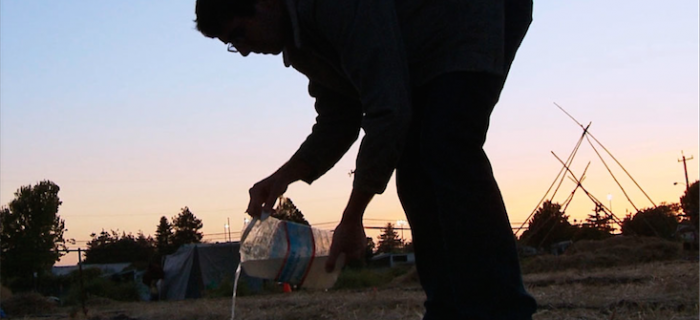Oxford Tract Struggle: It’s Not Starting from Zero
Photo by Todd Darling
The transfer of public goods to private hands for the benefit of those in power has become ubiquitous—so has community resistance.
Occupy the Farm, produced by Todd Darling, offers an in-depth and riveting example of this resistance. The film documents the actions of over 200 urban farmers who occupy and plant two acres of crops on a publicly-owned, university research farm in order to stop the University of California Berkeley from selling it off for private real estate development.
Student members of SOCLA-NA (Scientific Society for Agroecology North America chapter) organized a video forum for the viewing and discussion of the film. They organized the event to raise awareness of a new struggle for UC Berkeley’s Oxford Tract, another agricultural research station. As Joshua Arnold, a core organizer of the “Oxford resistance” explained, the University of California, Berkeley is planning to replace the Oxford Tract and Student Organic Garden with student housing. The Tract hosts over 1,000 students, faculty and community members for research, gardening, and education. This work is deeply tied to UC Berkeley’s mission as a Land Grant university. Further, the proposed housing development is not sufficient to meet the expected housing shortage, is proposed at market (not affordable) prices, and will not be an accessible community space.
Three of the original Gill Tract occupation organizers (Effie Rawlings, Anya Kamenskya, and David Grefrath) were on hand at the film showing to share their stories. They acknowledged that every moment was a challenge. They were learning on their feet — organizing resistance while working together on the land. They had to figure out how to respond to aggression and obstruction from university authorities and police and farm at the same time.
Food First’s Eric Holt-Giménez informed the audience about the upcoming book Land Justice: Re-imagining land, food and the commons in the United States, which includes a chapter on the Gill Tract occupation and explores the issues of land, food, and economy in the US. The question of land access, ownership, and redistribution in the US is not a part of national political discourse: “The only “land reform” we’ve ever had in the United States was genocidal,” he said, emphasizing that there is push-back now from the current food movement, that is beginning to come to terms with its biggest obstacle: you can’t grow food if you don’t have land.
An intense dialogue followed the screening, that highlighted priorities for the forthcoming struggle such as community involvement, mobilization strategies, and public relations actions.
Stay in the loop with Food First!
Get our independent analysis, research, and other publications you care about to your inbox for free!
Sign up today!The discussion brought together two parallel struggles to preserve public land. Occupy the Farm shows us that the Oxford Tract struggle does not have to start from square one; instead, there is already a strategic framework for resistance. Moreover, it shows that ordinary people are willing to fight for their right to public spaces and to engage with each other for the common good.
Occupy the Farm trailer: https://www.youtube.com/watch?v=D73MJcEsFlE
Rent the film for $0.99: https://www.youtube.com/watch?v=8Ol4JofbajM


 Help Food First to continue growing an informed, transformative, and flourishing food movement.
Help Food First to continue growing an informed, transformative, and flourishing food movement.




